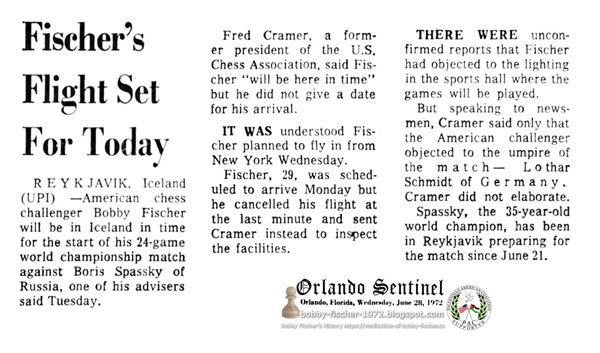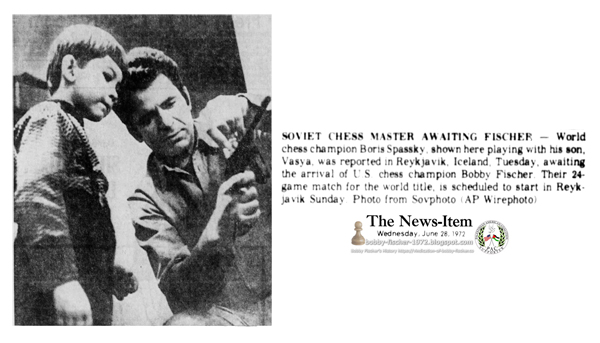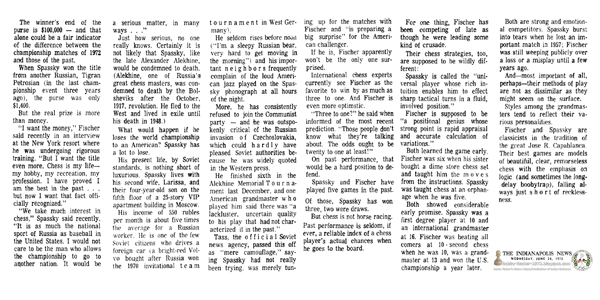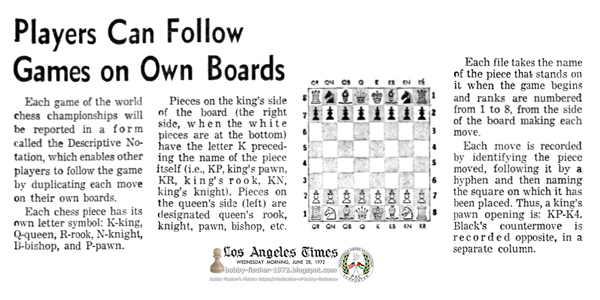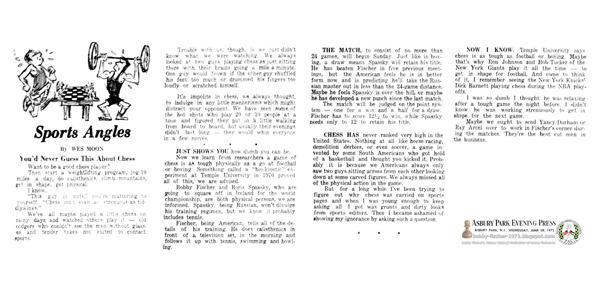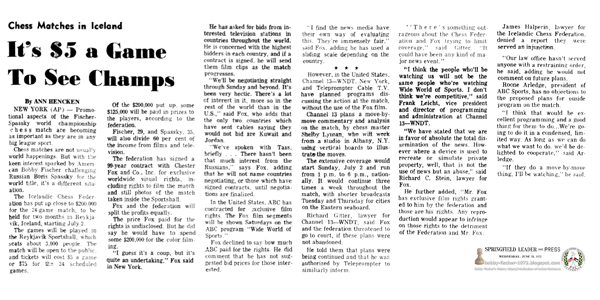The Orlando Sentinel Orlando, Florida Wednesday, June 28, 1972 - Page 12
Fischer's Flight Set For Today
Reykjavik, Iceland (UPI) — American chess challenger Bobby Fischer will be in Iceland in time for the start of his 24-game world championship match against Boris Spassky of Russia, one of his advisers said Tuesday.
Fred Cramer, a former president of the U.S. Chess Association, said Fischer “will be here in time” but he did not give a date for his arrival.
IT WAS understood Fischer planned to fly in from New York Wednesday.
Fischer, 29, was scheduled to arrive Monday but he cancelled his flight at the last minute and sent Cramer instead to inspect the facilities.
THERE WERE unconfirmed reports that Fischer had objected to the lighting in the sports hall where the games will be played.
But speaking to news-men, Cramer said only that he American challenger objected to the umpire of the match — Lothar Schmidt of Germany. Cramer did not elaborate.
Spassky, the 35-year-old world champion, has been in Reykjavik preparing for the match since June 21.
The News-Item, Shamokin, Pennsylvania, Wednesday, June 28, 1972 - Page 8
Soviet Chess Master Awaiting Fischer — World chess champion Boris Spassky, shown here playing with his son, Vasya, was reported in Reykjavik, Iceland, Tuesday, awaiting the arrival of U.S. chess champion Bobby Fischer. Their 24-game match for the world title, is scheduled to start in Reykjavik Sunday. Photo from Sovphoto (AP Wirephoto)
The Indianapolis News Indianapolis, Indiana Wednesday, June 28, 1972 - Page 83
World's Eyes Focus On A Chess Board
It will begin quietly next Sunday afternoon, in Iceland.
Promptly at 2 p.m. (Icelandic time), a Russian and an American will sit down to play a game of chess in a small auditorium at Reykjavik.
During the five hours that follow they probably will not exchange a dozen words. Nor will the audience. To a casual observer, it all might seem about as exciting and dramatic as a visit to a mausoleum.
But there will be no casual observers.
For this will be the first in a series of 24 games to decide the chess championship of the world — and this confrontation has drawn more worldwide interest than any other event of its kind in history.
The characters in this drama are pure Dostoyevsky:
1. The present champion, Boris Vasilyevich Spassky; a broad-shouldered bear who knows he must maintain the dominance that Russians have held in world chess since 1937, or face the consequences.
2. The challenger, Robert James “Bobby” Fischer; gangling, Chicago-born “enfant terrible of the chess world” who has called himself the “unofficial world champion” for nearly a decade and who now must prove his claim.
The winner's end of the purse is $100,000 — and that alone could be a fair indicator of the difference between the championship matches of 1972 and those of the past.
When Spassky won the title from another Russian, Tigran Petrosian (in the last championship event three years ago), the purse was only $1,400.
But the real prize is more than money.
“I want the money,” Fischer said recently in an interview at the New York resort where he was undergoing rigorous training. “But I want the title even more. Chess is my life—my hobby, my recreation, my profession. I have proved I am the best in the past … but now I want that fact officially recognized.”
“We take much interest in chess,” Spassky said recently. “It is as much the national sport of Russia as baseball in the United States. I would not care to be the man who allows the championship to go to another nation. It would be
a serious matter, in many ways…”
Just how serious, no one really knows. Certainly it is not likely that Spassky, like the late Alexander Alekhine, would be condemned to death. (Alekhine, one of Russia's great chess masters, was condemned to death by the Bolsheviks after the October, 1917, revolution. He fled to the West and lived in exile until his death in 1948.)
What would happen if he loses the world championship to an American? Spassky has a lot to lose.
His present life, by Soviet standards, is nothing short of luxurious. Spassky lives with his second wife, Larissa, and their four-year-old son on the fifth floor of a 25-story VIP apartment building in Moscow.
His income of 550 rubles per month is about five times the average for a Russian worker. He is one of the few soviet citizens who drives a foreign car (a bright-red Volvo bought after Russia won the 1970 invitational team tournament in West Germany).
He seldom rises before noon (“I'm a sleepy Russian bear, very hard to get moving in the morning”) and his important neighbors frequently complain of the loud American jazz played on the Spassky phonograph at all hours of the night.
More, he has consistently refused to join the Communist party — and he was outspokenly critical of the Russian invasion of Czechoslovakia, which could hardly have pleased Soviet authorities because he was widely quoted in the Western press.
He finished sixth in the Alekhine Memorial Tournament last December, and one American grandmaster who played him said there was “a lackluster, uncertain quality to his play that had not characterized it in the past.”
Tass, the official Soviet news agency, passed this off as “mere camouflage,” saying Spassky had not really been trying, was merely tuning up for the matches with Fischer and “is preparing a big surprise” for the American challenger.
If he is, Fischer apparently won't be the only one surprised.
International chess experts currently see Fischer as the favorite to win by as much as three to one. And Fischer is even more optimistic.
“Three to one?” he said when informed of the most recent prediction. “Those people don't know what they're talking about. The odds ought to be twenty to one at least!”
On past performance, that would be a hard position to defend.
Spassky and Fischer have played five games in the past. Of those, Spassky has won three, two were draws.
But chess is not horse racing. Past performance is seldom, if ever, a reliable index of a chess player's actual chances when he goes to the board.
For one thing, Fischer has been competing of late as though he were leading some kind of crusade.
Their chess strategies, too, are supposed to be wildly different: Spassky is called the “universal player whose rich intuition enables him to effect sharp tactical turns in a fluid, involved position.”
Fischer is supposed to be “a positional genius whose strong point is rapid appraisal and accurate calculation of variations.”
Both learned the game early. Fischer was six when his sister bought a dime store chess set and taught him the moves from the instructions. Spassky was taught chess at an orphanage when he was five.
Both showed considerable early promise. Spassky was a first degree player at 10 and an international grandmaster at 16. Fischer was beating all corners at 10 - second chess when he was 10, was a grand-master at 13 and won the U.S. championship a year later.
Both are strong and emotional competitors. Spassky burst into tears when he lost an important match in 1957; Fischer was still weeping publicly over a loss or a misplay until a few years ago.
And—most important of all, perhaps—their methods of play are not as dissimilar as they might seem on the surface.
Styles among the grandmasters tend to reflect their various personalities. Fischer and Spassky are classicists in the tradition of the great Jose R. Capablanca. Their best games are models of beautiful, clear, remorseless chess with the emphasis on logic (and sometimes the long-delay boobytrap), falling always just short of recklessness.
The Salina Journal Salina, Kansas Wednesday, June 28, 1972 - Page 23
Fischer and Spassky Will Split a Bundle of Money
The Icelandic Chess Federation has put up close to $200,000 for the 24-game match.
The games will be played in the Reykjavik Sportshall, which seats about 3,000 people. The match will be open to the public, and tickets will cost $5 a game or $75 for the 24 games.
Of the $200,000 put up, some $125,000 will be paid in prizes to the players, according to the federation.
Fischer, 29, and Spassky, 35, will also divide 60 per cent of the income from films and television.
The federation has signed a 99-year contract with Chester Fox and Co., Inc. for exclusive worldwide visual rights, including rights to film the match and still photos of the match taken inside the Sportshall.
In the United States, ABC has contracted for exclusive film rights. The Fox film segments will be shown Saturdays on the ABC program, “Wide World of Sports.”
Florida Today Cocoa, Florida Wednesday, June 28, 1972 - Page 1C
Chess Moves To Television
You can come out into the sun and rejoice, chess players, because your sport finally has hit the “big time.” In other words, after hundreds of years of being reserved for the intelligentsia, chess is going on network television.
The event is the world championship, which is scheduled to begin this Sunday in one if the sports capitals of the world —Reykjavik, Iceland.
The contestants are “Broadway” Bobby Fischer of America and Boris “Boom Boom” Spassky of the Soviet Union. Television, in its subtle way, is billing it as the “Chess Match of the Century.”
Orlando's Channel 24 will carry all Sunday matches, starting at approximately 1 p.m. and running until a decision or adjournment at 6 p.m. I'm told the Central Brevard cable hookup provides channel 24 (as channel 4). If you can't get channel 24, Wide World of Sports will show the highlights on July 8.
Fischer and Spassky are the best players in the world today. More than that, they have just two common bonds — chess and a mutual hatred.
From Spassky's point of view, Fischer is an arrogant savage without any couth.
From Fischer's point of view, Spassky is a snob and a chicken.
Instant Replay?
If television can capture the personalities of these two masters, it could be intriguing. However, if the TV people attempt to force the round game of chess into the square hole of conventional sports telecasting, the world championship may win an Emmy for best comedy of the year.
The coverage could turn out to be something like this…
“Hi there, sports fans… This is Frank Brady in beautiful downtown Reykjavik, where the sun never sets on the action game of chess.
“While you were watching a commercial for refrigerators, the first match between Fischer and Spassky got underway after the toss of the coin. Fischer won the toss and took black, so Spassky kicked off with his traditional opening of P-Q4 or pawn to Queen four for you housewives out there in videoland.
“Fischer has taken 15 minutes without making his first move, so that gives us a little time to give you an instant replay of Spassky's first move. To analyze our slow-motion, split-screen instant replay, let's call on my renowned colleague Wilfred Hyde Thames…”
“Ah, thank you, Frank. Ah, it certainly is a pleasure to be here in Reykjavik where Sol never descends on the dynamic conflict of two men commanding their armies in this game which is so symbolic of Man's eternal warlike nature and, ah…”
Coming to Grips
“Wilfred, please…”
“Ah, yes, quite right … Ah, as you can see in the instant replay of Spassky's first move, he prefers to grip the pieces with the thumb and forefinger of his right hand —moving them in a slow, deliberate manner … Now, ah, notice as Spassky places the pawn into its new space how he hesitates and takes one final, searching look before releasing his grip.”
“Isn't that something, folks! Tell us, Wilfred, how does Fischer's style contrast with Spassky's?”
“Ah, yes, quite right … Well, when Fischer decides to make his first move, you will notice he covers the pawn with his entire hand and moves quickly and aggressively…”
“Wonderful, Wilfred, but unfortunately we have run out of time and will have to sign off before Fischer's first move.
“However, you fans should stay tuned because we have a real treat in store for you … By popular demand, we're repeating ‘Heidi!’”
The Los Angeles Times Los Angeles, California Wednesday, June 28, 1972 - Page 27
Players Can Follow Games On Own Boards
Each game of the world chess championships will be reported in a form called the Descriptive Notation, which enables other players to follow the game by duplicating each move on their own boards.
Each chess piece has its own letter symbol: K-king, Q-queen, R-rook, N-knight, B-bishop, and P-pawn.
Pieces on the king's side of the board (the right side, when the white pieces are at the bottom) have the letter K preceding the name of the piece itself (i.e., KP, king's pawn, KR, king's rook, KN, king's knight). Pieces on the queen's side (left) are designated queen's rook, knight, pawn, bishop, etc.
Each file takes the name of the piece that stands on it when the game begins and ranks are numbered from 1 to 8, from the side of the board making each move.
Each move is recorded by identifying the piece moved, following it by a hyphen and then naming the square on which it has been placed. Thus, a king's pawn opening is: KP-K4. Black's countermove is recorded opposite, in a separate column.
Quad-City Times Davenport, Iowa Wednesday, June 28, 1972 - Page 2
Chess Interest Grows
New York (AP) — Promotional aspects of the Fischer-Spassky world championship chess match are becoming as important as they are in any big league sport.
Chess matches are not usually world happenings. But with the keen interest sparked by American Bobby Fischer challenging Russian Boris Spassky for the world title, it's a different situation.
The Icelandic Chess Federation has put up close to $200,000 for the 24-game match, to be held for two months in Reykjavik, Iceland, starting July 2.
THE GAMES will be played in the Reykjavik Sportshall, which seats about 3,000 people. The match will be open to the public, and tickets will cost $5 a game or $75 for the 24 scheduled games.
Of the $200,000 put up, some $125,000 will be paid in prizes to the players, according to the federation.
Fischer, 29, and Spassky, 35, also will divide 60 per cent of the income from films and television.
The federation has signed a 99-year contract with Chester Fox and Co., Inc. for exclusive worldwide visual rights, including rights to film the match and still photos of the match taken inside the Sportshall.
Fox and the federation will split the profits equally.
The price Fox paid for the rights is undisclosed. But he did say he would have to spend some $200,000 for the color filming.
“I GUESS its a coup, but it's quite an undertaking,” Fox said in New York.
He has asked for bids from interested television stations in countries throughout the world. He is concerned with the highest bidders in each country, and if a contract is signed, he will send them film clips as the match progresses.
In the United States, ABC has contracted for exclusive film rights. The Fox film segments will be shown Saturdays on the ABC program. “Wide World of Sports.”
However, in the United States, Channel 13 — WNIT, New York — and Teleprompter Cable TV have planned programs discussing the action at the match, without the use of the Fox film.
CHANNEL 13 plans a move-by-move commentary and analysis on the match by chess master Shelby Lyman who will work from a studio in Albany, N.Y. using vertical boards to illustrate the moves.
The extensive coverage would start Sunday, July 2 and run from 1 p.m. to 6 p.m., nationally. It would continue three times a week throughout the match, with shorter broadcasts Tuesday and Thursday for cities on the Eastern seaboard.
Richard Gitter, lawyer for WNDT, said Fox and the federation threatened to go to court, if these plans were not abandoned.
[Note: I had never heard of an event open to the public, i.e., boxing, wrestling, ice skating, hockey, baseball, et cetera big sporting events that forbid spectator photographs. But the Soviet saw to it that this match was completely censored from history. The Icelandic Federation forbids personal photos… then, would conveniently proceed to set up noisy camera men to guarantee Fischer will call off any prior agreement about cameras, which further results in Fox, suing Robert J. Fischer, personally, for 3.3 million US Dollars]
Austin American-Statesman Austin, Texas Wednesday, June 28, 1972 - Page 53
Fischer-Spassky Duel Becoming 'Big League'
…He has asked for bids from interested television stations in countries throughout the world. He is concerned with the highest bidders in each country, and if a contract is signed, he will send them film clips as the match progresses.
“We'll be negotiating straight through Sunday and beyond. It's been very hectic. There's a lot of interest in it, more so in the rest of the world than in the U.S.,” said Fox, who adds that the only two countries which have sent cables saying they would not bid are Kuwait and Jordan.
“We've spoken with Tass, briefly… There hasn't been that much interest from the Russians,” says Fox, adding that he will not name countries negotiating, or those which have signed contracts, until negotiations are finalized.
In the United States, ABC has contracted for exclusive film rights. The Fox film segments will be shown Saturdays on the ABC program, “Wide World of Sports.”
Reno Gazette-Journal Reno, Nevada Wednesday, June 28, 1972 - Page 2
Fischer Leaves For Chess Match
Los Angeles (AP)—American challenger Bobby Fischer has left Los Angeles after a final round of training for his world champion chess series in Iceland and is scheduled to leave New York tonight for Reykjavik, local sources said today.
The secretive Fischer spent about a week in California preparing for his series of 24 matches, set to start Sunday with the recognized champion, Boris Spassky of Russia, the sources said. They said Fischer attended a local chess tournament and visited his sister in San Francisco during his stay.
Meanwhile promotional aspects of the match are becoming as important as they are in any big league sport.
Chess matches are not usually world happenings. But with the keen interest sparked by American Bobby Fischer challenging Russian Boris Spassky for the world title, it's a different situation.
The Icelandic Chess Federation has put up close to $200,000 for the match.
The match will be open to the public, and tickets will cost $5 a game or $75 for the 24 games. Of the $200,000 put up, some $125,000 will be paid in prizes to the players, according to the federation. Fischer, 29, and Spassky, 35, will also divide 60 per cent of the income from films and television.
The federation has signed a 99-year contract with Chester Fox and Co., Inc. for exclusive worldwide visual rights, including rights to film the match and still photos of the match taken inside the Sportshall.
In the United States, ABC has contracted for exclusive film rights. The Fox film segments will be shown Saturdays on the ABC program, “Wide World of Sports.”
In the United States, Channel 13—WNDT, New York, and Teleprompter Cable T.V. have planned programs discussing the action at the match, with-out the use of the Fox film.
Channel 3 plans a move-by-move commentary and analysis on the match, by chess master Shelby Lyman, who will work from a studio in Albany, N.Y., using vertical boards to illustrate the moves.
The extensive coverage would start Sunday, July 2 and run from 1 p.m. to 6 p.m., nationally. It would continue three times a week throughout the match, with shorter broadcasts Tuesday and Thursday for cities on the Eastern Seaboard.
Asbury Park Press Asbury Park, New Jersey Wednesday, June 28, 1972 - Page 29
Sports Angles: You'd Never Guess This About Chess
Want to be a good chess player?
Then start a weightlifting program, jog 10 miles a day, do calisthenics, climb mountains, get in shape, get physical.
I know.
“This guy is nuts,” you're muttering to yourself. “Chess isn't even as strenuous as tiddlywinks.”
We've all maybe played a little chess on rainy days and watched others play it — old codgers who couldn't see the men without glasses and tender tykes not suited to contact sports.
Trouble with us, though, is we just didn't know what we were watching. We always looked at two guys playing chess as just sitting there with their brains going a mile a minute. One guy would frown if the other guy shuffled his feet too much or drummed his fingers too loudly or scratched himself.
It's impolite in chess, we always thought, to indulge in any little mannerisms which might distract your opponent. We have seen some of the hot shots who play 20 or 30 people at a time and figured they put in a little walking from board to board, but usually their evenings didn't last long — they would whip everyone in a few moves.
JUST SHOWS YOU how dumb you can be.
Now we learn from researchers a game of chess is as tough physically as a go at football or boxing. Something called a “bio-kinetic” experiment at Temple University in 1970 proved all of this we are advised.
Bobby Fischer and Boris Spassky, who are going to square off in Iceland for the world championship, are both physical persons, we are informed. Spassky, being Russian, won't divulge his training regimen, but we know it probably includes tennis.
Fischer, being American, tells all of the details of his training. He does calisthenics in front of a television set, in the morning and follows it up with tennis, swimming and bowling.
THE MATCH, to consist of no more than 24 games, will begin Sunday. Just like in boxing, a draw means Spassky will retain his title. He has beaten Fischer in five previous meetings, but the American feels he is in better form now and is predicting he'll take the Russian master out in less than the 24-game distance. Maybe he feels Spassky is over the hill, or maybe he has developed a new punch since the last match.
The match will be judged on the point system — one for a win and a half for a draw. Fischer has to score 12½, to win, while Spassky needs only to 12 to retain his title.
CHESS HAS never ranked very high in the United States. Nothing at all like horse racing, demolition derbies, or even soccer, a game invented by some South Americans who got hold of a basketball and thought you kicked it. Probably it is because we Americans always only saw two guys sitting across from each other looking down at some carved figures. We always missed all of the physical action in the game.
But for a long while I've been trying to figure out why chess was carried on sports pages and when I was young enough to keep asking all I got was grunts and dirty looks from sports editors. Then I became ashamed of showing my ignorance by asking such a question.
NOW I KNOW. Temple University says chess is as tough as football or boxing. Maybe that's why Ron Johnson and Bob Tucker of the New York Giants play it all the time — to get in shape for football. And come to think of it, I remember seeing the New York Giants Dick Barnett playing chess during the NBA play-offs.
I was so dumb I thought he was relaxing after a tough game the night before. I didn't know he was working strenuously to get in shape for the next game.
Maybe we ought to send Yancy Durham or Ray Arcel over to work in Fischer's corner during the matches. They're the best cut men in the business.
Springfield Leader and Press Springfield, Missouri Wednesday, June 28, 1972 - Page 13
It's $5 a Game To See Champs
By Ann Hencken
New York (AP) — Promotional aspects of the Fischer-Spassky world championship chess match are becoming as important as they are in any big league sport.
Chess matches are not usually world happenings. But with the keen interest sparked by American Bobby Fischer challenging Russian Boris Spassky for the world title, its a different situation.
The Icelandic Chess Federation has put up close to $200,000 for the 24-game match to be held for two months in Reykjavik, Iceland, starting July 2.
The games will be played in the Reykjavik Sportshall, which seats about 3,000 people. The match will be open to the public and tickets will cost $5 a game or $75 for the 24 scheduled games.
Of the $200,000 put up, some $125,000 will be paid in prizes to the players, according to the federation.
Fischer, 29, and Spassky, 35, will also divide 60 per cent of the income from films and television.
The federation has signed a 99-year contract with Chester Fox and Co., Inc. for exclusive worldwide visual rights, including rights to film the match and still photos of the match taken inside the Sportshall.
Fox and the federation will split the profits equally.
The price Fox paid for the rights is undisclosed. But he did say he would have to spend some $200,000 for the color filming.
“I guess it's a coup, but it's quite an undertaking,” Fox said in New York.
He has asked for bids from interested television stations in countries throughout the world. He is concerned with the highest bidders in each country, and if a contract is signed, he will send them film clips as the match progresses.
“We'll be negotiating straight through Sunday and beyond. It's been very hectic. There's a lot of interest in it, more so in the rest of the world than in the U.S.,” said Fox, who adds that the only two countries which have sent cables saying they would not bid are Kuwait and Jordan.
“We've spoken with Tass, briefly… There hasn't been that much interest from the Russians.” says Fox, adding that he will not name countries negotiating, or those which have signed contracts, until negotiations are finalized.
In the United States, ABC has contracted for exclusive film rights. The Fox film segments will be shown Saturdays on the ABC program “Wide World of Sports.”
Fox declined to say how much ABC paid for the rights. He did comment that he has not suggested bid prices for those interested.
“I find the news media have their own way of evaluating this. They're immensely fair,” said Fox, adding he has used a sliding scale depending on the country.
However, in the United States, Channel 13—WNDT. New York, and Teleprompter Cable T.V. have planned programs discussing the action at the match, without the use of the Fox film.
Channel 13 plans a move-by-move commentary and analysis on the match, by chess master Shelby Lyman, who will work from a studio in Albany, N.Y. using vertical boards to illustrate the moves.
The extensive coverage would start Sunday, July 2 and run from 1 p.m. to 6 p.m., nationally. It would continue three times a week throughout the match, with shorter broadcasts Tuesday and Thursday for cities on the Eastern seaboard.
Richard Gitter, lawyer for Channel 13—WNDT, said Fox and the federation threatened to go to court, if these plans were not abandoned.
He told them that plans were being continued and that he was authorized by Teleprompter to similarly inform.
“There's something outrageous about the Chess Federation and Fox trying to limit coverage,” said Gitter, “It could have been any kind of major news event.”
“I think the people who'll be watching us will not be the same people who're watching Wide World of Sports. I don't think we're competitive,” said Frank Leicht, vice president and director of programming and administration at Channel 13—WNDT.
“We have stated that we are in favor of absolute the total dissemination of the news. However where a device is used to recreate or simulate private property, well, that is not the use of news but an abuse,” said Richard C. Stein, lawyer for Fox.
He further added, “Mr. Fox has exclusive film rights granted to him by the federation and those are his rights. Any reproduction would appear to infringe on those rights to the detriment of the Federation and Mr. Fox.
James Halperin, lawyer for the Icelandic Chess Federation, denied a report they were served an injunction.
“Our law office hasn't served anyone with a restraining order, he said, adding he would not comment on future plans.
Roone Arledge, president of ABC Sports, has no objections to the proposed plans for outside program on the match.
“I think that would be excellent programming and a good thing for them to do… We're going to do it in a condensed, limited way. As long as we can do what we want to do, we'd be delighted to cooperate,” said Arledge.
“If they do a move-by-move thing, I'll be watching,” he said.
Philadelphia Daily News Philadelphia, Pennsylvania Wednesday, June 28, 1972 - Page 2
Taking Pawns Takes Brawn
If Bobby Fischer should beat Russia's Boris Spassky in the world's chess championship tournament next month, Fischer could try checkmating Joe Namath or Joe Frazier next. He'll certainly be in condition for it.
According to an experiment at Temple University, chess is every bit as physically taxing as a rugged session of football or boxing.
THE EXPERIMENT was conducted at Temple in 1970 by Charlotte Leedy, a chess player herself who was then a teaching fellow working on her doctorate. Now she is an assistant professor of recreation at the University of Maryland.
And, the professor insists, one must be in good shape to push those queens, castles and bishops around.
“My tests showed that the heart of a man running hard beats at the rate of 180 a minute,” she said. “That same heartbeat rate showed up in those concentrating on a tough game of chess.”
FISCHER, 29, has trained as physically hard for the match, set to begin Sunday in Reykjavik, Iceland, as any athlete. His daily regimen includes morning calisthenics in front of his television set, followed by swimming, tennis and bowling.
Though Fischer canceled his flight to Iceland last Monday and had the chess world wondering if he would show up for the event, an adviser yesterday promised the star would be there. The adviser, Fred Cramer, said Fischer objected to the umpire, Lothar Schmidt of Germany.
Despite the need for brawn as well as brain, chess gets the ho-hum treatment from most Americans. Russia has about 4 million chess players who compete in tournaments, America about 25,000.
But Fischer is our big hope to win the world championships. He's a Muhammad Ali of the chess board.
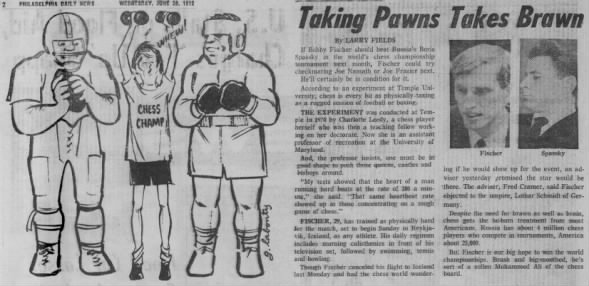 Taking Pawns Takes Brawn Wed, Jun 28, 1972 – Page 2 · Philadelphia Daily News (Philadelphia, Pennsylvania) · Newspapers.com
Taking Pawns Takes Brawn Wed, Jun 28, 1972 – Page 2 · Philadelphia Daily News (Philadelphia, Pennsylvania) · Newspapers.com
The Berkshire Eagle Pittsfield, Massachusetts Wednesday, June 28, 1972 - Page 1
World Champion Boris Spassky, right, with an interpreter, talks over the chess match in Reykjavik.
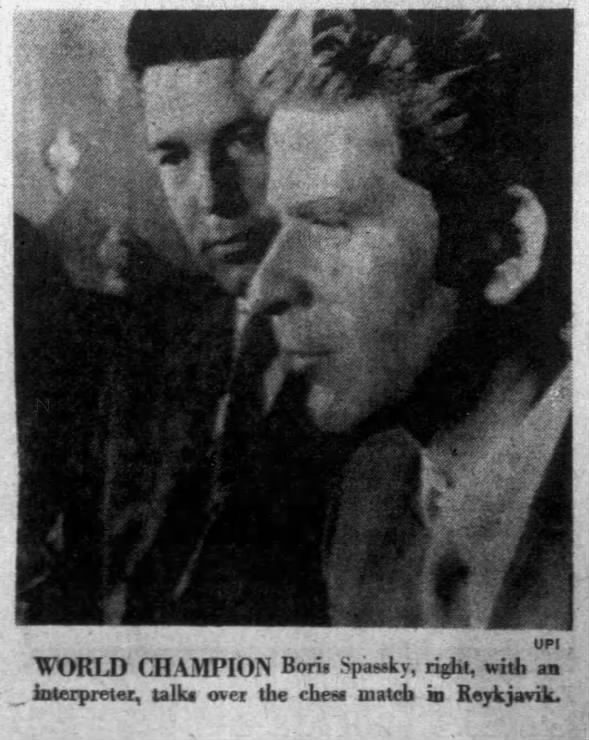 World Champion Wed, Jun 28, 1972 – 1 · The Berkshire Eagle (Pittsfield, Massachusetts) · Newspapers.com
World Champion Wed, Jun 28, 1972 – 1 · The Berkshire Eagle (Pittsfield, Massachusetts) · Newspapers.com
Calgary Herald Calgary, Alberta, Canada Wednesday, June 28, 1972 - Page 10
Chess Star May Yet Be Holdout
Reykjavik, Iceland (Reuter) — Preparations for the world chess championship opening here Sunday now are in full swing—but there is still no sign of the U.S. challenger Bobby Fischer.
The Russian world champion Boris Spassky arrived here a week ago to get acquainted with the surroundings and Icelandic chess officials are becoming nervous at the non-appearance of Fischer.
The officials became worried when the American failed to arrive by air Monday and immediately telephoned New York after they learned that he had cancelled his ticket on the flight.
In a telephone conversation with Fischer's lawyer in New York, the officials were advised that the American would arrive Thursday. But officials doubt that Fischer will he aboard Thursday's flight.
However, Fischer's representative, Fred Cramer, has arrived here and has stated that the American star wants to arrive in complete secrecy.
But officials of the Icelandic Chess Federation are mindful that Fischer threatened last winter he would not accept Reykjavik as the site of the championship.
The Boston Globe Boston, Massachusetts Wednesday, June 28, 1972 - Page 71
For all you chess fans, Ch. 2
The 25-year wait by the chess crowd since television's inception is about to end, thanks to the fame of Bobby Fischer.
Both Channel 2 and the American Broadcasting Co. yesterday revealed plans for coverage of the American's world-title match with the Russian Boris Spassky, which begins Sunday.
No live coverage will be available from Iceland for two reasons, the concentration factor and the dead air time. But Ch. 2, through Eastern Education Network and Public Broadcasting hookups will provide the next best thing: simulated moves on camera immediately after they occur, with experts in an Albany, N.Y. studio to explain and speculate about counter plays.
Iceland is five hours ahead of Boston, so the matches on Ch. 2 will begin at 1 p.m. on Sunday, Tuesday and Thursday of next week, ending at 4 p.m. on the first and third days and at 3 p.m. on the second day. If the matches extend beyond the five-hour TV time limit, Ch. 2 will offer one-minute summaries at 5, 5:30 and 6 p.m.
The hookup to Reykjavik, the capital of Iceland and site of the matches, will be via teletype, with a phone line to provide instant color appraisals, presumably describing the players' facial grimaces.
The format calls for matches on the same three days for eight consecutive weeks if necessary until either Fischer or Spassky gets 12½ points. One point is awarded for a victory, a half-point for a tie.
Now the bad news for chess folks. The coverage on Ch. 2 will run only one week unless $3500 in contributions are received from the public, the cost for the full eight weeks.
For those of us ignorant of the game, good old Wide World of Sports will come in each Saturday starting July 8 with a recapitulation of the three previous days' action. Bill Flemming, a familiar and friendly voice, will be the commentator, with Larry Evans as the expert.
A special spice will be provided by ABC cameras that will be taping at the scene. Fischer's demand for privacy apparently is exceeded by his quest for money, because the network reportedly is paying $100,000 in rights fees for the coverage. The participants will get a piece of it, although the Russian's share may well end up in the Kremlin petty-cash coffin.
In any case, both the Ch. 7 and local Ch. 5 coverage will be unique. And only the chess hardcore probably will really be able to grade the coverage.
Albuquerque Journal Albuquerque, New Mexico Wednesday, June 28, 1972 - Page 4
Physical Training for Chess
Many persons smirked when they read about Bobby Fischer's physical fitness program as he prepared for the world championship chess match against Boris Spassky of the Soviet Union.
Fischer's daily regimen includes morning calisthenics in front of his television set, followed by swimming, tennis and bowling. (Close-lipped Spassky won't disclose his own training program, although it is known he likes to play tennis.)
All this for a game in which the opponents mostly sit, wait, cerebrate and occasionally move a pawn, bishop or queen?
Science has proved, however, that Fischer isn't merely a health nut.
A bio-kinetic experiment was conducted at Temple University to determine how much energy is actually expended by a chess player in a tournament game. Pulse, heartbeat and other physiological measurements were taken on 12 volunteers during play.
The surprising result: Chess is as physically taxing as a strenuous session of boxing or football.
Bobby seems to have the last laugh.
Des Moines Tribune Des Moines, Iowa Wednesday, June 28, 1972 - Page 9
Soviet Chess Champ Sore At Lensmen
Reykjavik, Iceland (AP) — Russian Boris Spassky, who has a reputation for glacial calm, had an outburst of nerves Wednesday, less than a week before he risks his world chess championship against American Bobby Fischer.
Spassky stormed off a tennis court and went to his hotel after three photographers began taking pictures of him with Jivo Nei, a compatriot helping him train for the match.
“You are ruining our program,” Spassky said.
Outside
The photographers were not interfering with his tennis game. They stood outside a fence that surrounds the asphalt court in a schoolyard.
The Russian refused requests from the photographers for two minutes of his time, although they promised they would leave afterward.
After 15 minutes in the hotel, Spassky returned to the court with Nei.
Loser
To the delight of a bunch of Icelandic kids who shagged balls for the players, Nei thrashed Spassky in two straight sets.
Because of the great physical strain of the 24-game chess competition that will begin Sunday, both Spassky and Fischer have been working out regularly for months.
Fischer, 29, expected to arrive Thursday, is a good tennis player and swimmer. He is six years younger than the champion.
Chess players say the loser will be the man who tires first.
The Ottawa Journal Ottawa, Ontario, Canada Wednesday, June 28, 1972 - Page 6
Eagle and Fox?
Sirs: — It was a pleasant surprise to find your editorial on chess (Journal, June 24); the royal game is usually neglected by the press. However, I disagree with your metaphor. Fischer may be a chess eagle, but Spassky is no bear. On the chessboard he is as elusive and decisive as a fox. Thus the fascinating encounter: though eagles fly, many a bird has been tricked by the fox.
P. Stark, Ottawa.












